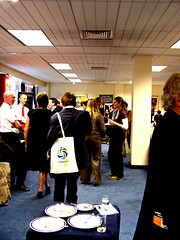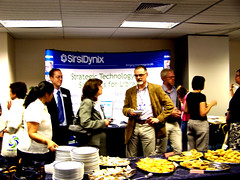The presentations for day one of the conference have drawn to a close and there’s only time for a quick blog post before we all head off for an evening of nautical fun and frolics on the “Three Rivers Cruise”. Cross your fingers no-one falls overboard!
Unfortunately, for “personal reasons”, CEO Gary Rautenstrauch isn’t at the conference, which is a shame.
The opening keynote by Keith Sturges talked about the continuing change within the company (something which most customers are only too aware of) and the continuing growth of the company (16%, compared to a sector average of 8%). The SaaS (Software as a Service) model is being pushed hard, with the UK hosted solution handled by IBM in Greenock, Scotland (“the most miserable place you could ever go to”!).
I’m still sceptical of SaaS being a “must have” for UK academic libraries. There are good and valid reasons why universities would prefer to have control over their servers and IT infrastructure — integration with other systems being a key one.
Next up, Kevin Rushbridge (Project Co-ordinator for the Swift Consortium) talked about the state wide consortia model set up in Victoria, Australia. I thoroughly interesting presentation — I think Kevin is speaking at a CILIP event soon? If so, he’s well worth going to see. I was tempted to put my hand up at the end and ask “did you consider Open Source?”, but manged to resist.
After the afternoon break, Talin Bingham (Chief Technology Officer) presented the Symphony product roadmap. As reported elsewhere, Enterprise is the upgrade path from EPS/Rooms and e-Library is the replacement OPAC for iBistro/iLink.
The big news from Talin is that Microsoft SQL Server 2005 will become an alternative database option for Symphony 3.3 (which is due 2009), with support for SQL Server 2008 coming afterwards.
One thing that’s always bugged me about iLink/iBistro is that the book title isn’t a clickable link in a set of search results. In the screenshot of e-Library, it looked like that was still the case.
Talin also mentioned that URSA is continued to be developed, but without support for the British Library, it’s a product that has very little relevance to many UK libraries.
I’ve not had chance to upload images from the presentations, but there’s a clutch of photos from the registration and lunch on Flickr:
www.flickr.com/photos/davepattern/tags/14may2008/



4 thoughts on “Southampton – day one”
Comments are closed.
I think that there is a lot of potential in the SaaS model.
I am interested to know whether there is any attempt here to build higher level services over the ‘serviced’ instances. For example, to aggregate circulation data for recommendation along the lines you have done locally.
This intrigued me, a title not linking to the results. And I don’t think it’s true on iBistro/iLink, although admittedly the title doesn’t look hyperlinked in the traditional blue underlined way.
Try https://ibistro.cambridgeshire.gov.uk or http://ilink.gcal.ac.uk/ the book title does the same thing as the Details button.
Subtle, but functional?
Wow — you’re right! All those times I’ve used a Unicorn OPAC and never noticed it 😀 So, why have they gone out of their way to make it not look like a link?
Lorcan — I was thinking about asking that question, but the Enterprise session was running waaay over time and lunch was awaiting!
The first Enterprise release will be SaaS only, and it would certainly make sense for SD to aggregate user supplied reviews, comments, tags, etc. Whether or not they’ve considered that, I don’t know.
My main concern with SaaS (which was echoed by every academic library admin I spoke to) is that it divorces you from your data and limits your ability to customise the product in ways SD either don’t want you to (for support reasons) or in ways they haven’t thought of. We’ve investigate SaaS style models for some of the other systems at Huddersfield (e.g. the VLE) and rejected it.
I don’t remember Talin mentioning that SaaS Enterprise would have an API. Without that, how do you even start to integrate a SaaS system with your internal systems (e.g. finance, student records, etc)?
For many years I’ve also been nervous about SaaS models, and have preferred to have a locally hosted solution.
However, over the last 12 months or so, I have started to change my mind about this.
Clearly SaaS doesn’t mean no APIs, and these would be essential in many areas. There could also be data protection issues with some data being held by 3rd parties (and other legal issues – for example if data was being held in a different country etc.)
However, I believe that we are starting to see a change. I asked a question about University Libraries using a hosted model for SFX at a recent meeting, and was suprised to find that Cambridge have opted for this model.
I’d be very interested in trying a SaaS in a low risk arena for the library, and seeing how it worked.
It looks like several vendors are offering their next gen search products as SaaS. We saw III yesterday and talked about this, but in this case the current lack of API to flexibly reuse data was offputting.